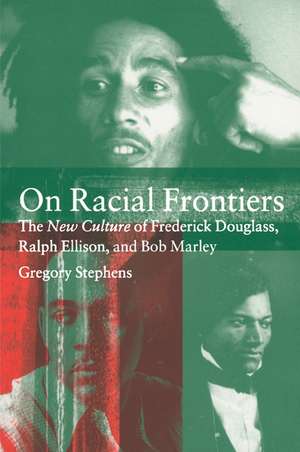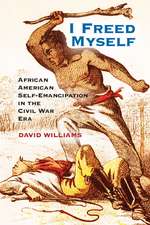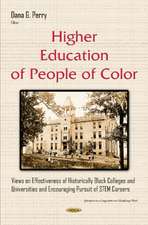On Racial Frontiers: The New Culture of Frederick Douglass, Ralph Ellison, and Bob Marley
Autor Gregory Stephensen Limba Engleză Paperback – 27 iun 1999
Preț: 291.91 lei
Nou
Puncte Express: 438
Preț estimativ în valută:
55.86€ • 58.32$ • 46.23£
55.86€ • 58.32$ • 46.23£
Carte tipărită la comandă
Livrare economică 05-19 aprilie
Preluare comenzi: 021 569.72.76
Specificații
ISBN-13: 9780521643931
ISBN-10: 0521643937
Pagini: 342
Ilustrații: 8 b/w illus.
Dimensiuni: 152 x 229 x 18 mm
Greutate: 0.55 kg
Editura: Cambridge University Press
Colecția Cambridge University Press
Locul publicării:Cambridge, United Kingdom
ISBN-10: 0521643937
Pagini: 342
Ilustrații: 8 b/w illus.
Dimensiuni: 152 x 229 x 18 mm
Greutate: 0.55 kg
Editura: Cambridge University Press
Colecția Cambridge University Press
Locul publicării:Cambridge, United Kingdom
Cuprins
Introduction; 1. Interraciality in historical context; 2. Frederick Douglass as integrative ancestor: the consequences of interracial co-creation; 3. Invisible community: Ralph Ellison's vision of a multiracial ideal democracy; 4. Bob Marley's Zion: a trans-racial 'blackman redemption'.
Recenzii
"Consistently, the book rewards with fresh insights. ...Stephens writes with passion and intellectual rigor for a most engaging text." THE BEAT
"An impassioned, historically informed, and lyrical meditation on race and its discontents. Stephens' book provocatively challenges the pieties of today's identity politics, providing us with 'integrative ancestors'--Douglass, Ellison, and Marley--whose examples point to interracial cultures and post-racial futures. This is an exemplary work in literary and cultural studies." Robert S. Levine, University of Maryland and author of Martin Delany, Frederick Douglass, and the Politics of Representative Identity
"Gregory Stephens persuasively interprets the work of Douglass, Ellison, and Marley as expressions of liberation, which put them into provocative conversation with each other, and with each and every reader who would understand and venture beyond the categories of race. On Racial Frontiers stands as a model of an integrative (and integrating) approach to the study of culture." John F. Callahan, Lewis and Clark College and literary executor of Ralph Ellison's estate
"Gregory Stephens explores the duality of Bob Marley's black-and-white heritage, and the internal conflicts it engendered in a man the New York Times says 'will be commemorated as a saint' in the 21st century. You will never think of this soul rebel in the same way again. Stephens' analysis of Marcus Garvey's racially biased and anti-Semitic dialectic, and his well-reasoned conclusions, are certain to cause clamorous debate." Roger Steffens, founding editor of The Beat and co-author of Bob Marley: Spirit Dancer
"In this innovative, imaginative and important book, Stephens probes key figures - Douglass, Ellison and Marley - who refused to be confined by rigid racialist binaries. On Racial Frontiers will inform and engage anyone interested in issues of race and culture in the modern world. This is a bold work of cultural studies that is as readable as it is informative." Shelley Fisher Fishkin, University of Texas-Austin and author of Was Huck Black? Mark Twain and African American Voices
"On Racial Frontiers is daring, compelling, and true to experience. Gregory Stephens breaks new ground by teaching us to think about the racial frontiers we live with but, all too often, refuse to discuss. Readers will come to think differently of Douglass, Ellison, and Marley - just as they will be challenged to reconsider their own relations to race." charles Lemert, Wesleyan University and author of Postmodernism Is Not What You Think and Social Theory: The Multicultural and Classic Readings
"Consistently, the book rewards with fresh insight. Stephens has done an admirable thing, rarer than it should be in scholarly works, which is to hit the center and explore the circumference of his subject." Michael Kuelker, The Beat
"An impassioned, historically informed, and lyrical meditation on race and its discontents. Stephens' book provocatively challenges the pieties of today's identity politics, providing us with 'integrative ancestors'--Douglass, Ellison, and Marley--whose examples point to interracial cultures and post-racial futures. This is an exemplary work in literary and cultural studies." Robert S. Levine, University of Maryland and author of Martin Delany, Frederick Douglass, and the Politics of Representative Identity
"Gregory Stephens persuasively interprets the work of Douglass, Ellison, and Marley as expressions of liberation, which put them into provocative conversation with each other, and with each and every reader who would understand and venture beyond the categories of race. On Racial Frontiers stands as a model of an integrative (and integrating) approach to the study of culture." John F. Callahan, Lewis and Clark College and literary executor of Ralph Ellison's estate
"Gregory Stephens explores the duality of Bob Marley's black-and-white heritage, and the internal conflicts it engendered in a man the New York Times says 'will be commemorated as a saint' in the 21st century. You will never think of this soul rebel in the same way again. Stephens' analysis of Marcus Garvey's racially biased and anti-Semitic dialectic, and his well-reasoned conclusions, are certain to cause clamorous debate." Roger Steffens, founding editor of The Beat and co-author of Bob Marley: Spirit Dancer
"In this innovative, imaginative and important book, Stephens probes key figures - Douglass, Ellison and Marley - who refused to be confined by rigid racialist binaries. On Racial Frontiers will inform and engage anyone interested in issues of race and culture in the modern world. This is a bold work of cultural studies that is as readable as it is informative." Shelley Fisher Fishkin, University of Texas-Austin and author of Was Huck Black? Mark Twain and African American Voices
"On Racial Frontiers is daring, compelling, and true to experience. Gregory Stephens breaks new ground by teaching us to think about the racial frontiers we live with but, all too often, refuse to discuss. Readers will come to think differently of Douglass, Ellison, and Marley - just as they will be challenged to reconsider their own relations to race." charles Lemert, Wesleyan University and author of Postmodernism Is Not What You Think and Social Theory: The Multicultural and Classic Readings
"Consistently, the book rewards with fresh insight. Stephens has done an admirable thing, rarer than it should be in scholarly works, which is to hit the center and explore the circumference of his subject." Michael Kuelker, The Beat
Descriere
Heroes of black history and consciousness reconsidered for a contemporary understanding of multiracial culture.











